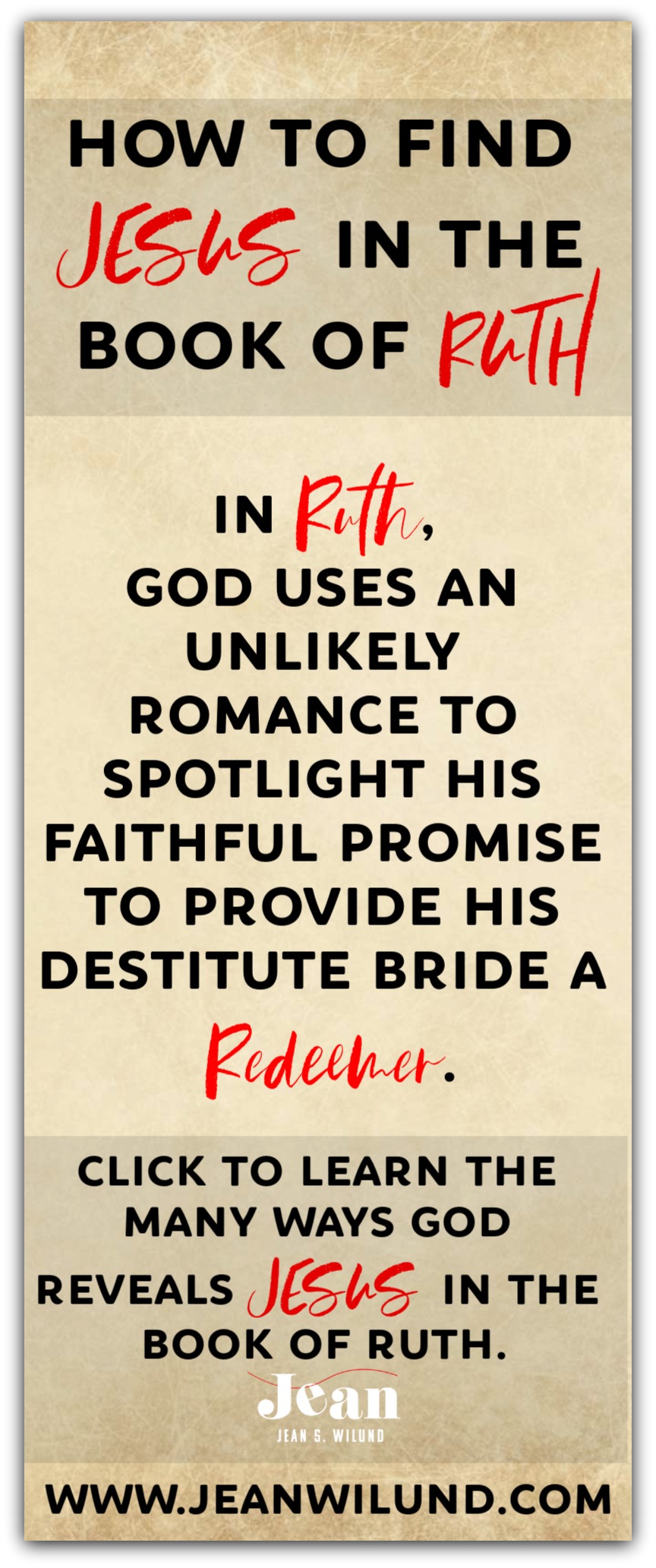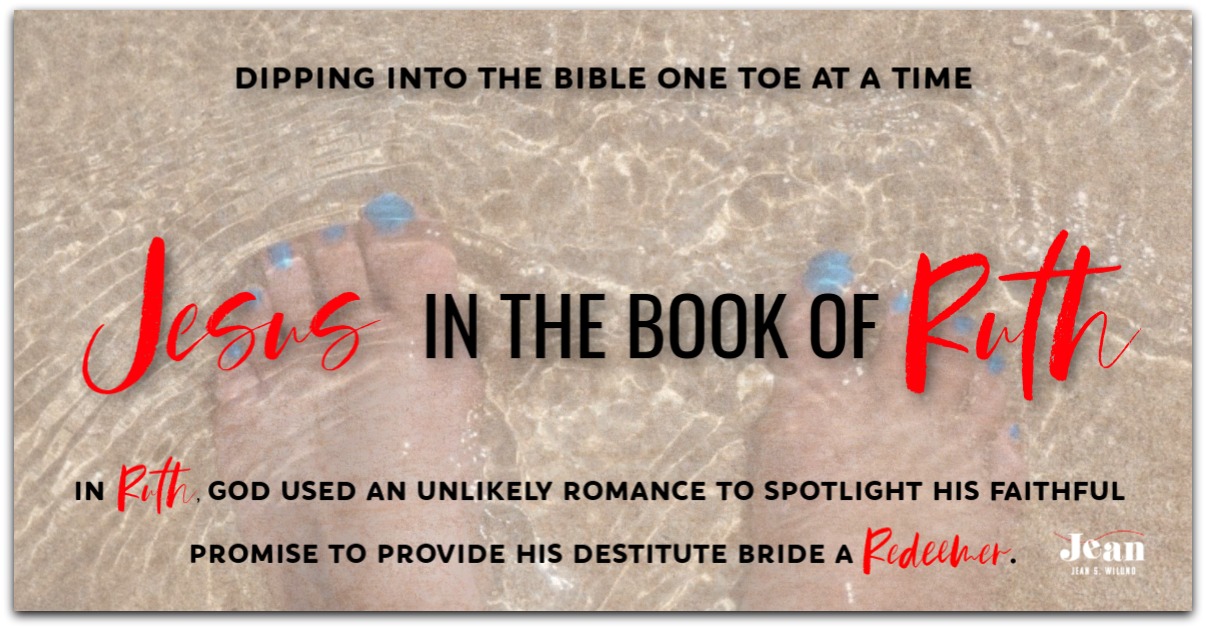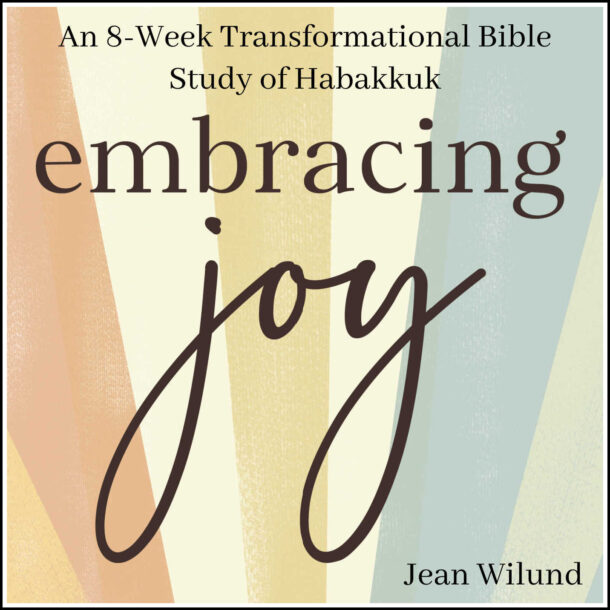RUTH ~ Book #8
Super-Short Summary:
In Ruth, God uses an unlikely romance to spotlight His faithful promise to provide His destitute Bride a Redeemer.
Less-Than-Super-Short Summary:
If you’re reading the Bible in order, you’re probably still numb from reading the book of Judges, where everyone did what was right in his own wretched and perverted eyes.
As we saw:
Joshua focuses on the Israelites conquering the Canaanites physically.
Judges focuses on the Canaanites conquering the Israelites spiritually.
Ruth focuses on the hope of God’s promise to provide a Redeemer for His destitute bride.
(I got those three descriptions from a great Bible teacher and my friend, Dede Gavlin. Thanks, Dede!)
While Judges enrages our hearts, Ruth lifts them with its unusual love story and reveals a hope that doesn’t disappoint.
The Destitute Bride (Ruth 1)
When we flip to the first page of the book of Ruth, we discover God had crushed the land of Israel under a famine.
(If you’re curious about why God would do that to His own people, check out the book of Judges. Trust me, you’d have crushed them, too.)
To flee the famine, Elimelech of Bethlehem took his wife, Naomi, and their two sons to sojourn—not stay—in the land of Moab.
(This was a strange choice since the Moabites were enemies of God.)
 In the land of Moab, tragedy befell them. Thrice. (That’s old-fashioned for “three times.”)
In the land of Moab, tragedy befell them. Thrice. (That’s old-fashioned for “three times.”)
1. Naomi’s husband Elimelech died
Painful, BUT, praise God, their two sons could care for Naomi.
The sons then married Moabite women — depsite God’s law forbidding Israelites to marry Moabites. Perhaps Naomi thought they could provide her with grandsons to care for her as well.
2. One son died
Tragic, BUT, praise God, Naomi still had one more son to care for her and his brother’s wife. And perhaps they could give her a grandson or two?
3. The other son died
Devastation.
Sure, Naomi and her two daughters-in-law were still alive, but they were now destitute. Utterly destitute. Neither daughter-in-law had even given birth to a child who could grow up and care for them.
Naomi looked around at her foreign home and helpless state. She had nothing left but God. (Which means she had all she needed, but she didn’t quite realize that yet.)
Hope (Ruth 1-2)
 Word reached Naomi that the Lord had given His people food in Israel.
Word reached Naomi that the Lord had given His people food in Israel.
It was time to go home.
Naomi’s daughters-in-law set out with her, but Naomi urged them to return to their families in Moab and their gods.
Orpah hugged Naomi and left.
Ruth clung to Naomi. She refused to leave her.
But Ruth said, “Do not urge me to leave you or to return from following you. For where you go I will go, and where you lodge I will lodge. Your people shall be my people, and your God my God. Where you die I will die, and there will I be buried. May the Lord do so to me and more also if anything but death parts me from you.” And when Naomi saw that she was determined to go with her, she said no more. ~ Ruth 1:16-18, NASB
(Interesting Note: This passage is quite popular for weddings. I wonder how many realize this declaration of love wasn’t voiced to a beloved groom by his bride, but by a daughter-in-law to her mother-in-law. Take that, mother-in-law jokes!)
Naomi returned to Jerusalem with an empty belly and a bitter heart. But she still had Ruth. Sweet, faithful Ruth.
Ruth rose early to glean—to scavenge pieces of grain dropped by the harvesters in the fields.
It just so happened that she found herself gleaning in the field of Boaz, one of Naomi’s rich relatives. (It so happened? Yeah, right. We can be sure it was God’s hand at work.)
Boaz learned of Ruth’s stellar reputation and kindness to Naomi. He, in turn, showed Ruth kindness. He gave her extra grain to share with Naomi and a doggy bag from lunch.
When Ruth told Naomi that Boaz owned the field, Naomi’s heart leaped, and her faith set down new roots because she knew something Ruth didn’t:
Boaz was their kinsman redeemer!
Education Intermission — Kinsman Redeemer
I interrupt this story for a quick lesson on the Kinsman Redeemer.
“The kinsman-redeemer is a male relative who, according to various laws of the Pentateuch [the first five books of the Bible], had the privilege or responsibility to act on behalf of a relative who was in trouble, danger, or need. The Hebrew term (go el) for kinsman-redeemer designates one who delivers or rescues (Genesis 48:16; Exodus 6:6) or redeems property or person (Leviticus 27:9–25, 25:47–55).” (quoted from GotQuestions.com)
The kinsman-redeemer could redeem property or even a widowed wife by marrying her and caring for her.
But only a family member who was willing and able could pay the redemption price.
He had to be free of personal debt.
Back to Our Story . . .
Ruth Gets a Redeemer (Ruth 3 & 4)
 Following Naomi’s instructions for appealing to Boaz as her kinsman redeemer, Ruth prepared herself as a bride.
Following Naomi’s instructions for appealing to Boaz as her kinsman redeemer, Ruth prepared herself as a bride.
Then she waited until he fell asleep on the threshing floor and lay down at his feet.
(I agree if this sounds strange to you. But it made sense in those days. Boaz slept on the threshing floor to protect the grain from thieves. And Ruth’s lying at his feet was actually a respectful way to say, “I’d like you to be my kinsman redeemer.”)
Boaz was both willing and able to redeem Ruth. Yay!
But there was a man who was an even closer relative than Boaz. This man must be given the chance to redeem Ruth. Ugh.
Boaz sat down with this other relative (along with witnesses), and just as he’d hoped, the man was able to redeem Ruth but not willing.
With much joy, Boaz redeemed Ruth and took her as his beloved bride.
Ruth, the Moabite, had once been an enemy of God. But through her faith in Him, she became a friend of God and her kinsman redeemer’s bride.
In time, the Lord blessed Ruth and Boaz with a son, Obed.
No longer destitute or without a family, the salvation of the Lord through their kinsman redeemer filled them with joy and peace.
Ruth and Naomi praised God as Naomi cradled her grandson and the women of Israel called her blessed.
The book of Ruth closes with a peek into the future and a fun fact:
Ruth and Boaz’s son Obed was the ancestor of King David, Israel’s greatest king, and of Jesus Christ, our Kinsman Redeemer.
Jesus, Our Kinsman Redeemer
 The kinsman redeemer is one of the Old Testament’s most powerful pictures of Jesus, our Kinsman Redeemer.
The kinsman redeemer is one of the Old Testament’s most powerful pictures of Jesus, our Kinsman Redeemer.
Only Jesus could ever qualify to serve as our Redeemer.
- Jesus was free of all debt. Born of a virgin, He was free of inherited sin.
The rest of us are born with sin. It’s passed down from our first father, Adam.
Despite Satan’s best but futile efforts to tempt Jesus in sin, He never fell for any of Satan’s lies. He remained debt-free of sin.
- Which means, Jesus was willing and able to pay our redemption price through His death on the cross.
Out of His great love and riches, Jesus redeemed us.
- All who accept Jesus as their Kinsman Redeemer become members of His precious Bride, the church (aka known as the family of Believers).
He bought us with a bride price much greater than the price Boaz paid for Ruth. He bought us with His own shed blood on the cross.
Today is the Day of Salvation
If you’ve not accepted Christ as your Kinsman Redeemer, today is the perfect day for it. Naomi’s husband and sons remind us we’re not promised tomorrow.
God alone knows the number of our days. Trust in your Kinsman Redeemer Jesus today.
(And please let me know when you do, so I can celebrate with you.)







